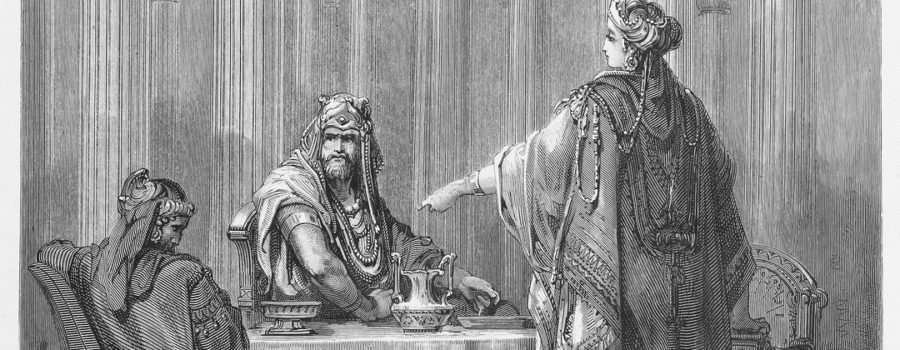Purim begins on the eve of Wednesday, March 6, 2023 and concludes on Thursday, March 7, 2023. Jewish and Gentile believers in Christ (Messiah) reflect and celebrate God’s faithfulness to guide, protect, and intervene in the lives of His sons and daughters–both natural (biological) and grafted in (adopted) (Romans 11, NASB).
One of my favorite movies is One Night with the King. It shares the divine guidance of God and the reverence and courage of Esther (Hebrew: Hadassah). The Book of Esther has been one of my favorite accounts in the Bible for many years and long before I understood or began to cherish the Jewish heritage and Messianic roots of my Christian faith. As I have grown in my faith, I have come to thoroughly enjoy history, and biblical history is absolutely fascinating to me. However, as I completed my undergrad in History I often left lectures saddened by the realization the majority of biblical history is excluded in secular academia. Why? Biblical History is history, and the history of Persia’s king-Xerxes, his Jewish Queen-Esther (Hadassah) and Esther’s uncle, Mordecai the Jew, should not be omitted. As I studied Classical History and the predominant cultures during the era of Christ, I began to notice this even more. While studying Greek history, there was only a scant mention of the Greek Septuagint, the earliest known manuscript of the Old Testament prior to the discovery of the Dead Sea Scrolls. Yet, great recognition and credibility were regularly given to the writings of non-biblical manuscripts such as those about Aristotle, Sophocles, Virgil, and Ovid (to name a few), and these manuscripts only number in the dozens with the earliest dating to c. 350 years after their deaths (writings of Aristotle and Sophocles date 1,000 years after their deaths). In comparison, the Bible has 1,000s of manuscripts in existence, and they date much earlier. Yet, recognition of the Bible as a viable historical writing is far less, and its credibility is questioned far more in comparison. Many try to discredit and/or exclude biblical accounts from history altogether, and this is why it is crucial followers of Christ commemorate the events, celebrate the appointed times, and teach the history of God and Christ from generation to generation (L’ dor V’dor)…for such a time as this. Our world desperately needs the wisdom, hope, and love the Bible offers to all (1 Corinthians 2:14).
God used king Xerxes, queen Esther and Mordecai to preserve the Davidic line through which Christ, the Messiah, descended, and the most significant theme of the Book of Esther is the sovereignty of the Great I Am in our lives. I believe there is great significance in the fact that although the name of God is not recorded or mentioned in the Book of Esther, His presence and guidance are undeniable, and through celebrations of Purim and regular reading of the Book of Esther, we are reminded of God’s faithfulness to be with us and guide us even when it appears He is not. Just as God divinely guided Mordecai and Esther’s every step–from Mordecai’s sack cloth, ashes, and wailing by the king’s gate…to his “for such a time as this” encouragement to Esther…to Esther’s request for all Jews to fast for God’s wisdom, protection, and intervention…to the king’s heart in the hand of God (Proverbs 21:1), his extension of the golden scepter as Esther defied royal customs…to every banquet request Esther petitioned being granted…to Xerxes’ sleepless night and request to have the Chronicles read…to Mordecai’s honor, Esther’s courage…to justice and vindication (Isaiah 54:17): the Persian king’s edict (law) stamped with his signet ring giving Jews of the 127 provinces from India to Cush the right to protect themselves from any attempt to harm, plunder, or kill them–He still guides, protects, and intervenes in our day-to-day lives as we, too, humble ourselves, acknowledge Him (Proverbs 3:5-6), pray (2 Chronicles 7:14), seek (Jeremiah 29:13), listen (John 10:27), trust (Psalm 32:8), and wait (Psalm 46:10-11). What a dramatic turn of events…from a scheme of annihilation to a royal edict of kingdom wide protection. To God be all the glory, and may His guidance and intervention in your life leave you in awe and wonder as well.
The timeline and themes below provide a concise history of events and validate the intimacy of God with those who believe, seek, follow, and draw close to Him. May we all be encouraged in these uncertain times as we reflect on the faithfulness of God as recorded in biblical history and the Book of Esther. May we all seek to live our lives in alignment with the truth that He is the same God today as He was in the days of old (Hebrews 13:7, 8). May the words of our mouths and the meditations of our hearts be acceptable in Your sight (Psalm 19:14), and may we never lose sight of Who/what we have been called to represent as ambassadors…for such a time as this (2 Corinthinas 5:20, Esther 4:14).
TIMELINE OF EVENTS
Fall of Jerusalem 586 B.C.
Persia’s conquest of Babylon 539 B.C.
First return of exiles to Jerusalem 538 B.C.
Xerxes’ reign in Persia 486 – 465 B.C.
Esther’s reign in Persia 479 B.C.
Second return to Jerusalem under Ezra 458 B.C.
Third return to Jerusalem under Nehemiah 445 B.C.
Jerusalem’s wall rebuilt 445 B.C.
Book of Esther written c. 460-350 B.C.
THEMES OF THE BOOK
GOD’S SOVEREIGNTY – His name is not recorded in the Book, but His presence and guidance are undeniable, and this is available for every believer.
SERVANT OF THE KING (Hebrew: EVED HAMELECH) – God can use whoever He chooses and often uses those who are fully surrendered in reverence and obedience to Him.
WISDOM – Esther sought the wisdom of God through fasting, prayer, and listening.
OBEDIENCE – Mordecai obeyed and honored God above all else, and Esther obeyed her uncle and guardian, Mordecai, above Persian Law. One of my favorite theologians, Dr. Charles Stanley, has taught 1000s of believers the simple life principle, “Obey God and leave all the consequences to Him.”
PRIDE – Haman’s pride and hatred led to his destruction and death (Proverbs 16:18), and Mordecai’s commitment to do that which he believed was honoring of God and in alignment with His ways caught the attention of God who revealed his deeds to the king.
PHOTO CREDIT
Queen Esther defending her people. Picture from The Holy Scriptures-Old and New Testament books collection published in 1885, Stuttgart-Germany. Drawing by Gustave Dore.





